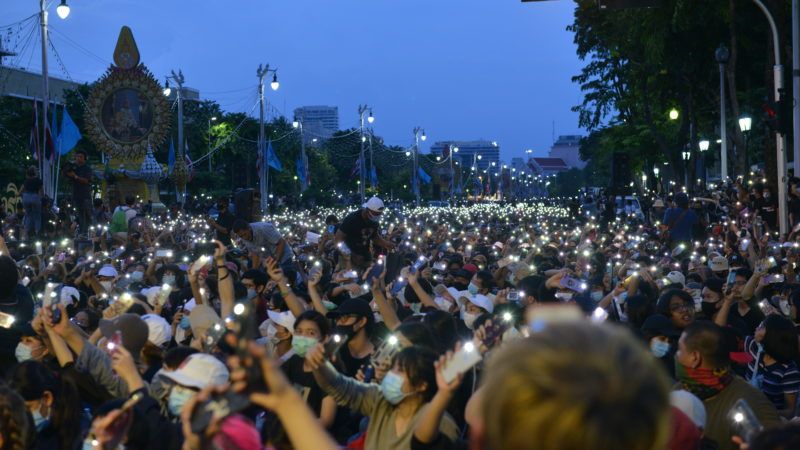10,000 Gather In Bangkok to Protest Thailand's Monarchy
Increasing tensions between the military-backed ruling class and the student-led democracy movement have prompted massive rallies in the capital.

Bangkok was rocked by mass protests Sunday, as thousands of pro-democracy citizens gathered in opposition to Thailand's military-backed monarchy.
Upwards of 10,000 people participated in the rally, according to organizers and law enforcement. The event attracted a myriad of groups, including feminist and gay rights organizations that are typically out of frame in Thailand's conservative culture. But the demonstration's chief themes were self-government, civil liberties, and the economic devastation wrought by COVID-19. The rally featured a speech from a transgender rights activist and a performance by a group called Rap Against Dictatorship. As night fell, attendees waved phone flashlights in the air.
The rally was also met with a small counter-protest of around 60 royalists waving Thai flags and reenacting historical massacres of dissidents, but the gathering fizzled out.
Law enforcement was largely hands-off at the protests themselves. But the country's Criminal Court subsequently announced charges for 15 organizers, who planned to turn themselves into authorities.
Since Thailand's absolute monarchy fell in 1932, the country has seen 12 military coups. It was led directly by a military government until 2019, and it continues to have a military-backed regime. Displeasure with the Thai government had been brewing since the 2019 election: Despite winning a majority of parliamentary seats, the opposition Pheu Thai Party was not allowed to form a government after many reported irregularities and electoral rule changes, leading many to call the results rigged. As a result, the incumbent prime minister, Prayuth Chan-Ocha, was allowed to remain in power.
Discontent with the Thai government has been exacerbated by the COVID-19 pandemic. A massive drop in tourism, which drives 10 percent of Thailand's GDP, contributed to a 12.2 percent contraction of GDP in the second quarter of this year. The outbreak was exploited to legitimize an extensive crackdown against dissent, according to an Amnesty International report.
Although Thailand is technically a constitutional monarchy, King Maha Vajiralongkorn holds significant sway over the country's government, and has established an "unprecedented degree of control over the military, the police and the judiciary" according to Pavin Chachavalpongpun of Kyoto University. While the country's last king, Bhumibol Adulyadej, was highly revered, Vajiralongkorn is much less popular. He rules abroad from Germany.
Protests in Thailand have grown massively in the last few weeks. Last weekend, about 3,000 people attended a student rally at Thammasat University, where organizers presented the regime with 10 reform demands, including the abolition of the lèse-majesté law, which punishes defamation of the monarchy with prison terms of up to 15 years. The activists also called on the king to stop legitimizing military coups. (Historically, the monarchy has aligned itself with the military and against civilian rule.)
Success for the coalition is far from certain. The Thai government has been measured in its response thus far, but historically it has had few reservations about using deadly force to curb dissent. In 1976, right-wing paramilitary forces, with the backing of law enforcement, murdered at least 46 protesters, and perhaps as many as 100, at Thammasat University.
